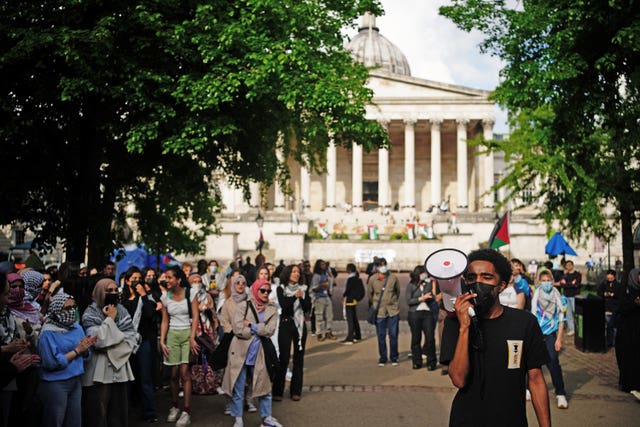
Universities must “crack down” on antisemitic abuse on campuses and ensure protests do not disrupt university life, the Education Secretary has said.
Ministers will call on university leaders to take immediate disciplinary action if any student is found to be inciting racial hatred or violence, and to contact the police if a criminal act has been committed.
It comes as pro-Palestine encampments have been set up by students at more than a dozen universities across the UK against the war in Gaza, including Cambridge and Oxford.
Vice-chancellors from some of the leading universities in the UK will meet at Number 10 on Thursday to discuss action to address the rise in antisemitic abuse on campuses and disruption to students’ learning.
Prime Minister Rishi Sunak, Education Secretary Gillian Keegan, Communities Secretary Michael Gove and Security Minister Tom Tugendhat will call for a zero-tolerance approach to antisemitic abuse at universities.

Ahead of the meeting, Ms Keegan said: “I have made it absolutely clear that universities must crack down on antisemitic abuse and ensure that protests do not unduly disrupt university life.”
She said she hoped it would help ensure that there are steps in place to protect Jewish students.
Mr Sunak said: “Universities should be places of rigorous debate but also bastions of tolerance and respect for every member of their community.
“A vocal minority on our campuses are disrupting the lives and studies of their fellow students and, in some cases, propagating outright harassment and antisemitic abuse. That has to stop.”
In the autumn statement in November, the Chancellor announced that £7 million of extra support would be committed to tackle antisemitism in schools and universities.
Of this, £500,000 will be dedicated to supporting the work of the University Jewish Chaplaincy, which helps students deal with incidents of antisemitism and intimidation.
A number of student protests have been held across the UK over the Israel-Hamas conflict.
On Wednesday, an Edinburgh University student taking part in a hunger strike in protest against the war in Gaza said it was a “last resort” after other methods of protest failed.
The student is one of five people currently on hunger strike in the city, with more members of the university’s Justice for Palestine Society due to join in the coming days.
Edinburgh University principal and vice-chancellor, Professor Sir Peter Mathieson, urged the students on hunger strike not to risk their health.
The Union of Jewish Students (UJS) has criticised encampment protests for creating a “hostile and toxic atmosphere” on campus for Jewish students.
On Tuesday, Edward Isaacs, president of the UJS, said “university inaction” against hateful language from protests “only serves to alienate Jewish students from campus”.
Representatives from the UJS and Jewish charity the Community Security Trust (CST) will also attend the meeting on Thursday to share experiences.
It is hoped the meeting with vice-chancellors will help to inform upcoming government guidance on combating antisemitism on campus.
In 2023, 182 university-related antisemitic incidents were recorded by the CST compared with 60 incidents in 2022 – a rise of 203%.
Mark Gardner, chief executive of the CST, said: “The growth of antisemitism on British campuses is appalling and an affront to the fundamental principles and values of university life.
“Everyone has the right to protest, but they do not have the right to disrupt other students’ learning, harass and threaten Jewish students, or spread hatred of Israel with calls for ‘resistance’ and other extremist language.
“University authorities need to set out clear boundaries for the timing, location and content of these protests and ensure there are consequences for anyone who breaks them.”
A spokesman for the UJS said: “Government and university leaders must acknowledge the surge in antisemitic incidents since October 7, UJS’s increased support efforts, and the resilience of Jewish students.
“Universities must act decisively to combat hate on campus. UJS stands ready to work with all stakeholders to tackle this urgent issue.”
The Office for Students (OfS) has committed to publishing the response to its consultation on a new condition of registration, which could give OfS the power to impose sanctions where there is clear evidence that universities are failing to take action to tackle harassment, including antisemitic abuse.


Comments: Our rules
We want our comments to be a lively and valuable part of our community - a place where readers can debate and engage with the most important local issues. The ability to comment on our stories is a privilege, not a right, however, and that privilege may be withdrawn if it is abused or misused.
Please report any comments that break our rules.
Read the rules here